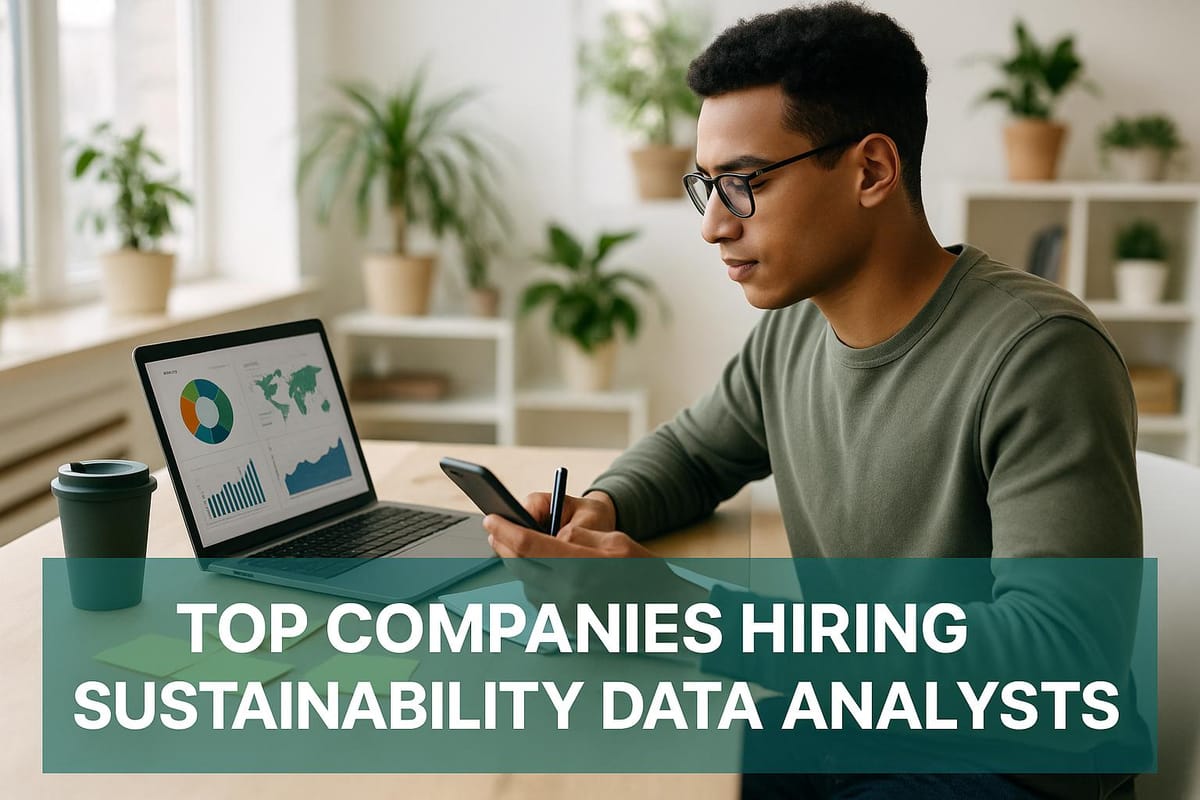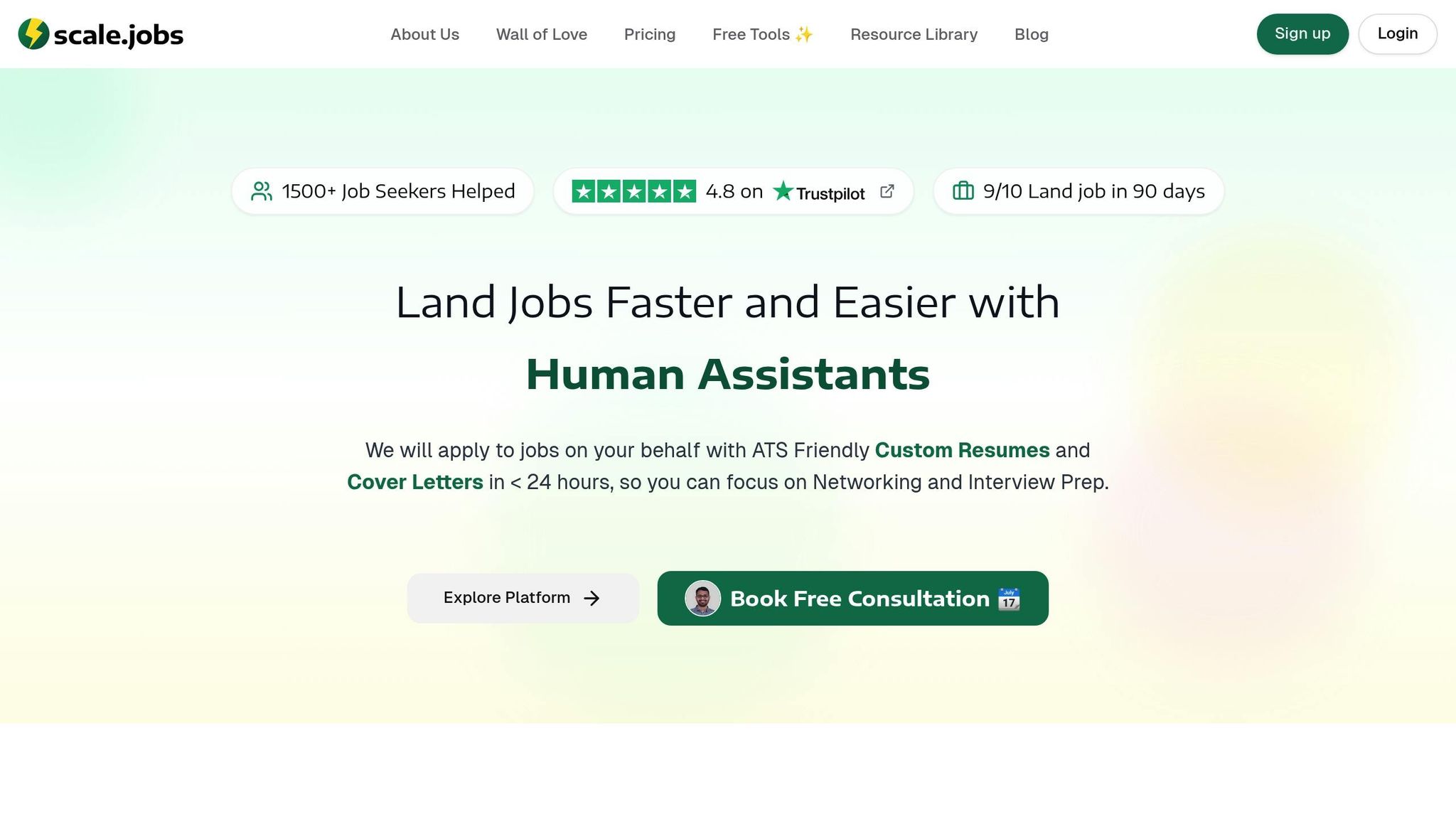Top Companies Hiring Sustainability Data Analysts
Explore the rising demand for Sustainability Data Analysts, essential skills needed, and how specialized platforms can enhance your job search.

The demand for Sustainability Data Analysts is on the rise as companies focus on achieving their environmental goals through data-driven strategies. These professionals analyze complex datasets, create actionable reports, and support organizations in meeting regulatory and corporate sustainability objectives. Key skills include proficiency in tools like Python, R, Tableau, and familiarity with frameworks such as GRI and SASB. Competitive salaries and steady job growth make this a promising career path.
Key Points:
- Role Overview: Analyze environmental data to guide sustainability strategies.
- Skills Needed: Programming (Python, SQL), data visualization (Tableau, Power BI), ESG frameworks (GRI, SASB), and statistical analysis.
- Salary & Growth: Competitive pay and increasing job opportunities in industries like consumer goods, real estate, and consulting.
- Job Search Tools: Platforms like scale.jobs offer tailored support, including ATS-optimized resumes, AI-powered cover letters, and application tracking.
- Education & Certifications: Degrees in environmental science or data analytics are common, with certifications like LEED or GRI Standards adding value.
To stand out, candidates should focus on building technical expertise, understanding sustainability frameworks, and crafting personalized applications. Services like scale.jobs streamline the application process, allowing more time for interview preparation and networking.
ESG Careers Explained: Top Jobs, Skills & Certifications for 2025
Companies Hiring Sustainability Data Analysts Now
The job market for sustainability professionals is growing quickly, with opportunities popping up in industries like multinational consumer goods, energy-efficient real estate, and ESG-focused consulting. With this surge in demand, using advanced tools to refine your job search can make a big difference.
Boosting Your Job Search with Specialized Platforms
As job openings increase, platforms designed for targeted job searches can give you a significant advantage. For example, scale.jobs stands out by offering tailored services that go beyond traditional job boards. Here’s what it brings to the table for sustainability professionals:
- Resume optimization tailored for ATS systems and sustainability-specific roles
- AI-powered, personalized cover letters to make your applications stand out
- Human assistant services with real-time WhatsApp support and clear proof-of-work
- An application tracker that helps you stay organized across multiple job prospects
Platforms like scale.jobs make it easier to stay competitive in the fast-moving field of Sustainability Data Analytics, ensuring you don’t miss out on the latest opportunities.
Required Skills for Sustainability Data Analysts
Sustainability Data Analysts need a mix of technical expertise and professional abilities to succeed. Employers seek individuals who can connect environmental science with data analytics, requiring a unique blend of hard and soft skills.
Technical Skills
Data Analysis and Programming are at the core of this role. Tools like Python and SQL are essential for handling and interpreting data from environmental monitoring systems and corporate sustainability platforms.
Visualization Tools such as Tableau and Power BI play a key role in presenting complex sustainability metrics. Proficiency in these platforms allows analysts to create visual reports that convey insights effectively to stakeholders and regulators.
Sustainability Frameworks and Standards are another critical area. Familiarity with frameworks like GRI, SASB, and TCFD sets candidates apart. Additionally, understanding ESG rating methodologies from providers like MSCI and Sustainalytics can give candidates an advantage when companies assess their sustainability performance.
Statistical Analysis skills, whether through R or advanced Excel functions, are vital for identifying patterns in areas like resource usage, waste reduction, and energy efficiency.
These technical skills directly support an organization's sustainability objectives and are highly sought after by employers.
Professional Skills
Communication and Data Storytelling are essential for translating technical data into actionable insights. Sustainability Data Analysts must be able to present complex environmental information in a way that resonates with diverse audiences, from executives to operational teams.
Cross-functional Collaboration is another key requirement. Analysts often work with teams across procurement, operations, and legal departments to implement sustainability initiatives. The ability to collaborate effectively while maintaining data accuracy is highly valued.
Project Management skills ensure timely and compliant sustainability reporting. Familiarity with project management tools and methodologies is a significant asset in this field.
"You should focus on what matters the most - Interview Prep - and let us handle the rest", says Shubham Dhakle, Outcome Manager at Scale.jobs.
This advice is especially relevant for sustainability professionals, as technical interviews often include case studies that test both analytical skills and domain knowledge.
Education and Certifications
Bachelor's Degrees in fields like environmental science, data analytics, statistics, or related disciplines are often required. However, many employers prioritize strong technical skills and hands-on experience with sustainability metrics, sometimes even over formal education.
Professional Certifications can also enhance your qualifications. Certifications such as LEED (Leadership in Energy and Environmental Design) for construction-related roles, GRI Standards for sustainability reporting, and Carbon Trust for carbon management expertise are highly regarded.
Continuing Education in areas like AI in sustainability reporting can help candidates stand out in a competitive market. Many professionals take online courses in environmental data science or attend industry conferences to stay updated on evolving trends.
How to Apply for Sustainability Data Analyst Jobs
Breaking into a sustainability data analyst role requires more than just technical know-how - it’s about crafting a focused, strategic application. With intense competition in this field, a well-thought-out approach can make all the difference.
Writing ATS-Optimized Resumes and Cover Letters
Many large companies use Applicant Tracking Systems (ATS) to filter resumes before they even reach human eyes. To pass this initial hurdle, your resume needs to be ATS-friendly, which means including relevant keywords like "GRI Standards", "SASB frameworks", "carbon footprint analysis", and "ESG reporting." However, it’s important to integrate these terms naturally into your resume.
Quantifiable achievements can set you apart. For example, instead of saying you "analyzed sustainability data", try something like, "analyzed carbon emissions data for 15 manufacturing facilities, identifying $2.3M in potential energy savings through process optimization." This not only highlights your skills but also shows the tangible impact of your work.
When it comes to cover letters, personalization is key. Avoid generic templates and instead tailor each letter to the specific company. Reference their sustainability initiatives or recent ESG reports you’ve come across on their website. This demonstrates genuine interest and that you’ve done your homework.
Keep formatting simple and professional. Use standard fonts like Arial or Calibri, and save your documents in both PDF and Word formats to ensure they’re easily parsed by ATS systems.
Once your resume and cover letter are ready, choosing the right tools for your job search can further enhance your strategy.
How scale.jobs Beats Other Job Search Tools

Traditional job platforms can be frustrating, often delivering generic results and low response rates. Enter scale.jobs, which combines advanced technology with human expertise to create a more tailored job search experience.
Unlike services like FindMyProfession’s reverse recruiting, LazyApply’s bulk submissions, or Simplify.jobs’ basic networking features, scale.jobs stands out with transparent flat-fee pricing, personalized support via WhatsApp, and proof-of-work clarity. This ensures quality applications specifically tailored to sustainability roles.
What makes scale.jobs especially effective is its human-powered approach.
"We're here to take the burden off your shoulders, so you can focus on what truly matters – preparing for interviews and building meaningful connections",
explains Leela Yanamaddi, Co-Founder of scale.jobs.
The platform also boasts impressive results - 46% of users secure jobs through strategic networking. Plus, their 24-hour turnaround for custom resumes and cover letters means you can quickly respond to new opportunities in this fast-paced market.
Beyond using advanced tools, combining job boards and networking is essential to landing a role.
Using Job Boards and Networking Tools
Job boards are a great starting point, but networking often plays the bigger role in actually getting hired. LinkedIn is a critical platform for sustainability professionals. Start by optimizing your profile with relevant keywords and actively engaging with posts from companies like Henkel and QuadReal Property Group - both of which are known for hiring sustainability data analysts. Thoughtful comments on topics like ESG reporting or carbon accounting can help showcase your expertise.
Platforms like scale.jobs take networking up a notch by automating outreach while keeping it personal. For instance, it can help identify hiring managers and send tailored messages that reference specific company initiatives or job requirements. These personalized touches often lead to higher response rates compared to generic connection requests.
In addition to general job boards, explore industry-specific platforms like GreenBiz Jobs or SustainabilityJobs.com. Joining professional associations such as the International Society of Sustainability Professionals (ISSP) or the Association of Climate Change Officers (ACCO) can also uncover hidden opportunities. Many roles in this field are filled through referrals before they even hit public job boards.
"I would recommend trying out scale.jobs to anyone looking to make more time in their schedule for interview prep and networking, so that the repetitive portion of the job application process can be outsourced",
shares Anuva Agarwal, a satisfied scale.jobs customer.
What's Next for Sustainability Data Analytics
Sustainability data analytics is moving beyond its traditional boundaries, adapting to broader technological shifts and evolving workplace dynamics. While effective application strategies remain important, new trends are reshaping the role of sustainability analysts and hinting at the skills future professionals in this field will need.
AI in Sustainability Reporting
AI is playing a growing role in environmental reporting, automating data collection and analysis to uncover patterns and insights. However, human expertise is still critical for interpreting these findings and crafting strategies that lead to meaningful action. As AI tools become more sophisticated, they are not replacing professionals but complementing their work, enabling them to focus on higher-level decision-making. At the same time, shifts in work practices are influencing how sustainability experts approach their roles.
Remote and Hybrid Work Options
The rise of remote and hybrid work models has transformed many data-driven professions, including sustainability analytics. These flexible arrangements remove geographical barriers, allowing professionals to work from virtually anywhere while fostering collaboration across regions. For sustainability analysts, this means a chance to tap into a global talent pool and engage with diverse perspectives. However, it also emphasizes the need to stay updated with new tools and methods to remain effective in these changing environments.
Skills to Learn for Better Job Prospects
To thrive in this evolving landscape, sustainability data analysts should focus on building both technical expertise and a strong grasp of environmental principles. Proficiency in data visualization, programming languages, and key reporting frameworks can make complex data more accessible and actionable. At the same time, staying informed about environmental trends and policies ensures that your insights are both relevant and impactful. Regularly updating these skills is essential to stay ahead in a competitive and ever-changing field.
Conclusion
The career landscape for sustainability data analysts is growing, fueled by the increasing demand for professionals who can transform environmental data into meaningful action. Companies like Henkel, QuadReal, and IMPACT/Knowledge for Impact are actively seeking these experts to help achieve their environmental and regulatory goals. As ESG reporting and compliance become central to business operations, the ability to interpret complex data and provide actionable insights is more valuable than ever.
To excel in this field, aspiring analysts need a strong mix of technical skills and a solid grasp of sustainability principles. Employers are on the lookout for candidates who can connect the dots between environmental science and business strategies, making this an opportune moment to step into or advance within the profession.
However, breaking into this field can be tough - fewer than 2% of applicants typically land interview callbacks. This is where services like scale.jobs can make a real difference. With an impressive 93% of their users securing jobs within three months, scale.jobs offers tailored support to help your application stand out. Their virtual assistants craft ATS-friendly resumes and cover letters specifically designed for sustainability roles, giving you more time to focus on networking and interview prep. As one satisfied user, Sona Tambe, shared:
"Such a great initiative and service! Applying for jobs every day has been super daunting. But now with scale.jobs, one can apply to 100s of jobs per day as well as focus on prep for interviews."
This personalized, efficient approach not only simplifies the job search process but also sets you up for success in a field that’s evolving with advancements like AI and remote work. By leveraging professional tools and strategies, you can navigate the competitive landscape, secure opportunities faster, and even negotiate better salaries.
FAQs
Which industries are currently hiring Sustainability Data Analysts, and what is driving the demand?
Sustainability Data Analysts are becoming essential across industries like renewable energy, manufacturing, technology, and finance. These fields are ramping up their sustainability efforts to comply with government regulations, meet ESG (Environmental, Social, and Governance) targets, and respond to the growing consumer preference for eco-conscious practices.
With businesses focusing on cutting carbon emissions, using resources more efficiently, and ensuring supply chain transparency, the need for experts who can interpret sustainability data has surged. As organizations aim to meet global sustainability benchmarks, the demand for these skilled professionals shows no signs of slowing down.
What are the best ways to improve my resume and cover letter for a Sustainability Data Analyst role?
To make your application stand out for a Sustainability Data Analyst role, focus on crafting a resume and cover letter that align closely with the job description. Emphasize key skills like data analysis, sustainability metrics, and proficiency with tools such as Excel, Python, or Tableau. Highlight your achievements with clear, measurable results - like cutting energy consumption by a specific percentage or enhancing data accuracy.
Ensure your documents are ATS-friendly by opting for straightforward formatting and incorporating keywords from the job posting. Consider using tools like AI-driven resume builders or feedback platforms to polish your content. Lastly, maintain a professional tone by keeping your resume and cover letter concise, well-organized, and free of errors. Combining these steps with a personalized touch can significantly improve your chances of securing the role.
How can specialized job search platforms like scale.jobs help candidates land roles in sustainability data analytics?
Specialized job search platforms like scale.jobs make finding roles in sustainability data analytics much easier. They offer AI-powered tools to help candidates craft customized resumes, cover letters, and even interview responses - designed to make applications stand out from the crowd. On top of that, their human assistant services provide one-on-one support, helping with document optimization and streamlining the entire job application process. This saves candidates both time and effort.
With features like real-time updates, proof of work, and a straightforward flat-fee pricing model, scale.jobs brings clarity and value to the job search experience. These resources allow candidates to focus more on networking and acing interviews, ultimately improving their chances of landing the perfect role.




